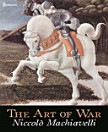The Essential Writings of Machiavelli
জুলাই ২০০৯ · Modern Library
৩.৫star
৬ টা পৰ্যালোচনাreport
ইবুক
544
পৃষ্ঠা
family_home
যোগ্য
info
reportমূল্যাংকন আৰু পৰ্যালোচনা সত্যাপন কৰা হোৱা নাই অধিক জানক
এই ইবুকখনৰ বিষয়ে
FINALIST--2008 PEN TRANSLATION PRIZE
In The Essential Writings of Machiavelli, Peter Constantine has assembled a comprehensive collection that shows the true depth and breadth of a great Renaissance thinker. Refreshingly accessible, these superb new translations are faithful to Machiavelli’s original, beautifully crafted writings.
The volume features essays that appear in English for the first time, such as “A Caution to the Medici” and “The Persecution of Africa.” Also included are complete versions of the political treatise, The Prince, the comic satire The Mandrake, The Life of Castruccio Castracani, and the classic story “Belfagor”, along with selections from The Discourses, The Art of War, and Florentine Histories. Augmented with useful features–vital and concise annotations and cross-references–this unique compendium is certain to become the standard one-volume reference to this influential, versatile, and ever timely writer.
“Machiavelli's stress on political necessity rather than moral perfection helped inspire the Renaissance by renewing links with Thucydides and other classical thinkers. This new collection provides deeper insight into Machiavelli’s personality as a writer, thus broadening our understanding of him.”
–Robert D. Kaplan, author of Warrior Politics: Why Leadership Demands a Pagan Ethos
“Constantine’s selection is not only intelligent; his translations are astonishingly good. Thoughtfully introduced by Albert Russell Ascoli, this edition belongs in everyone’s library.”
–John Jeffries Martin, professor and chair, department of history, Trinity University
“If one were to assign a single edition of Machiavelli's works, this most certainly would be it.”
–John P. McCormick, professor, department of political science, University of Chicago
In The Essential Writings of Machiavelli, Peter Constantine has assembled a comprehensive collection that shows the true depth and breadth of a great Renaissance thinker. Refreshingly accessible, these superb new translations are faithful to Machiavelli’s original, beautifully crafted writings.
The volume features essays that appear in English for the first time, such as “A Caution to the Medici” and “The Persecution of Africa.” Also included are complete versions of the political treatise, The Prince, the comic satire The Mandrake, The Life of Castruccio Castracani, and the classic story “Belfagor”, along with selections from The Discourses, The Art of War, and Florentine Histories. Augmented with useful features–vital and concise annotations and cross-references–this unique compendium is certain to become the standard one-volume reference to this influential, versatile, and ever timely writer.
“Machiavelli's stress on political necessity rather than moral perfection helped inspire the Renaissance by renewing links with Thucydides and other classical thinkers. This new collection provides deeper insight into Machiavelli’s personality as a writer, thus broadening our understanding of him.”
–Robert D. Kaplan, author of Warrior Politics: Why Leadership Demands a Pagan Ethos
“Constantine’s selection is not only intelligent; his translations are astonishingly good. Thoughtfully introduced by Albert Russell Ascoli, this edition belongs in everyone’s library.”
–John Jeffries Martin, professor and chair, department of history, Trinity University
“If one were to assign a single edition of Machiavelli's works, this most certainly would be it.”
–John P. McCormick, professor, department of political science, University of Chicago
মূল্যাংকন আৰু পৰ্যালোচনাসমূহ
৩.৫
৬ টা পৰ্যালোচনা
লিখকৰ বিষয়ে
Niccolò Machiavelli (1469-1527) was born in Florence. He served the Florentine republic as secretary and second chancellor, but was expelled from public life when the Medici family returned to power in 1512. His most famous work, The Prince, was a written attempt to reingratiate himself with the Medicis and return to politics.
Peter Constantine is the recipient of a PEN Translation Prize and a National Translation Award. His Modern Library translations include Voltaire’s Canidide, Tolstoy’s The Cossacks, and Gogol’s Taras Bulba. He lives in New York City.
Peter Constantine is the recipient of a PEN Translation Prize and a National Translation Award. His Modern Library translations include Voltaire’s Canidide, Tolstoy’s The Cossacks, and Gogol’s Taras Bulba. He lives in New York City.
এই ইবুকখনক মূল্যাংকন কৰক
আমাক আপোনাৰ মতামত জনাওক।
পঢ়াৰ নির্দেশাৱলী
স্মাৰ্টফ’ন আৰু টেবলেট
Android আৰু iPad/iPhoneৰ বাবে Google Play Books এপটো ইনষ্টল কৰক। ই স্বয়ংক্রিয়ভাৱে আপোনাৰ একাউণ্টৰ সৈতে ছিংক হয় আৰু আপুনি য'তে নাথাকক ত'তেই কোনো অডিঅ'বুক অনলাইন বা অফলাইনত শুনিবলৈ সুবিধা দিয়ে।
লেপটপ আৰু কম্পিউটাৰ
আপুনি কম্পিউটাৰৰ ৱেব ব্রাউজাৰ ব্যৱহাৰ কৰি Google Playত কিনা অডিঅ'বুকসমূহ শুনিব পাৰে।
ই-ৰীডাৰ আৰু অন্য ডিভাইচ
Kobo eReadersৰ দৰে ই-চিয়াঁহীৰ ডিভাইচসমূহত পঢ়িবলৈ, আপুনি এটা ফাইল ডাউনল’ড কৰি সেইটো আপোনাৰ ডিভাইচলৈ স্থানান্তৰণ কৰিব লাগিব। সমৰ্থিত ই-ৰিডাৰলৈ ফাইলটো কেনেকৈ স্থানান্তৰ কৰিব জানিবলৈ সহায় কেন্দ্ৰত থকা সবিশেষ নিৰ্দেশাৱলী চাওক।







